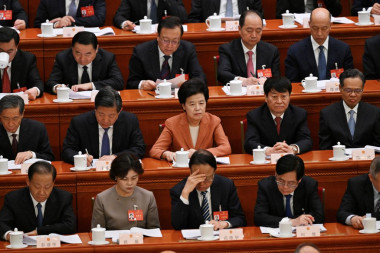Authoritarian China model facing 'increasing failure' as country's economy needs 'less government intervention and more market' to restore confidence, Chinese economist says
cross-posted from: feddit.org/post/1733210
The authoritarian China model under President Xi Jinping’s leadership is facing increasing failure.
“Its most critical flaw lies in the unconstrained power of the ruling Chinese Communist Party (CCP), arbitrarily intervening in market and social activities for the interest of itself or its leaders without robust mechanisms for accountability and self-correction,” writes Chris Lee, a Chinese economist and political strategist.
The China model, in effect, is an institutional system that combines extensive state control and ownership of resources with limited free-market activity, all led by the authoritarian CCP.
[…]
The China model, in effect, is an institutional system that combines extensive state control and ownership of resources with limited free-market activity, all led by the authoritarian CCP.
[…]
Internationally, the China model is more combative, aggressive and expansionist than before. The CCP aims to reshape the world order. It presses on with the Belt and Road Initiative for involvement in foreign economies, establishes its own multilateral organisations and gets involved in geopolitical issues.
[…]
And yet, despite the CCP’s belief in the China model, the Chinese market is losing its dynamism.
The combined market value of private companies, which peaked at US$4.745 trillion in 2021, had fallen below US$2 trillion by the end of 2023.
Foreign direct investment was a mere US$33 billion in 2023, less than 10 percent of the $344 billion reached in 2021 and the lowest level since 1993.
Due to the decline in domestic consumption and investment, the youth unemployment rate has exceeded a critical 15 percent since 2022, and the International Monetary Fund forecasts China’s annual GDP growth will be just 4.6 percent in 2024 and fall to around 3.5 percent by 2028.
The West’s efforts to de-risk their economies, reducing exposure to China in manufacturing and strategic technologies, are exacerbating China’s prospects. China’s rise is losing momentum.
[…]
To restore confidence in the future of China, Xi needs to reduce government intervention in the market and create a level playing field in which SOEs [state-owned enterprises] and private businesses can compete and foreign capital can flow.
The CCP needs to apply the rule of law and relax repression on civil society, thereby freeing the creativity and dynamism of the people. It should abandon ideological antagonism towards Western democracies and re-engage with the outside world. These actions will not undermine the CCP’s legitimacy to govern, which is Xi’s biggest concern. On the contrary, they will strengthen the foundation of its rule, which has been economic success.
